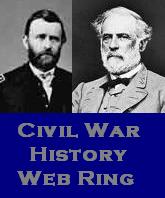I found an account of a Grand Review of troops in Washington DC in the October 26, 1861 edition of Harper's Weekly yesterday. McClellan reviewed a large portion of the cavalry and artillery assigned to his army on a broad plain east of the Capitol, some 5,500 cavalry and 18 batteries of artillery. According to the report, there had been an earlier cavalry review approximately one fourth the size of this one had taken place previously. Apparently it hadn't gone as well, as the reporter mentions McClellan stating that on this occasion he "noticed a marked improvement."
In addition to McClellan, the President and Mrs Lincoln, Secretary Seward and several other generals were present. One of them, interestingly enough at this point in the war, was General Hooker, who would later be so integral to the restructuring the cavalry in the Army of the Potomac.
Among the regular cavalry units present for the review were all ten companies of the 5th Cavalry, eight companies of the 6th, two companies of the 4th, and one of the 2nd.
It is surprising that the 6th Cavalry was able to field eight companies at this time, since the orders authorizing the creation of the regiment and the beginning of recruiting were dated June 16, 1861.
The two companies of the 4th Cavalry were most likely Companies A and E, which had served under McClellan during the Peninsula campaign. Their strength in April 1862 at the beginning of the campaign had been 4 officers and 104 men between the two companies. Captain McIntyre commanded the squadron. This must have been a last hurrah in the eastern theater for these two companies, as they reported back to regimental headquarters in Tennessee later in the month.
I was also very surprised by the following words of the article over a year into the war. In fairness to Stoneman they are a quote of the article and not his words. "In many of the squadrons of the cavalry all the horses were of one color, which will be universally the case as soon as General Stoneman, Chief of Cavalry, can arrange it. He will also brigade the various regiments, and number them as volunteer cavalry, ignoring States."
Obviously neither of these two things ever happened, but the fact that they were considered or mentioned says something about the understanding of the cavalry at this time. Personally, I find it much more likely that this was the reporter's idea than something an experienced cavalryman would consider.
Subscribe to:
Post Comments (Atom)


No comments:
Post a Comment